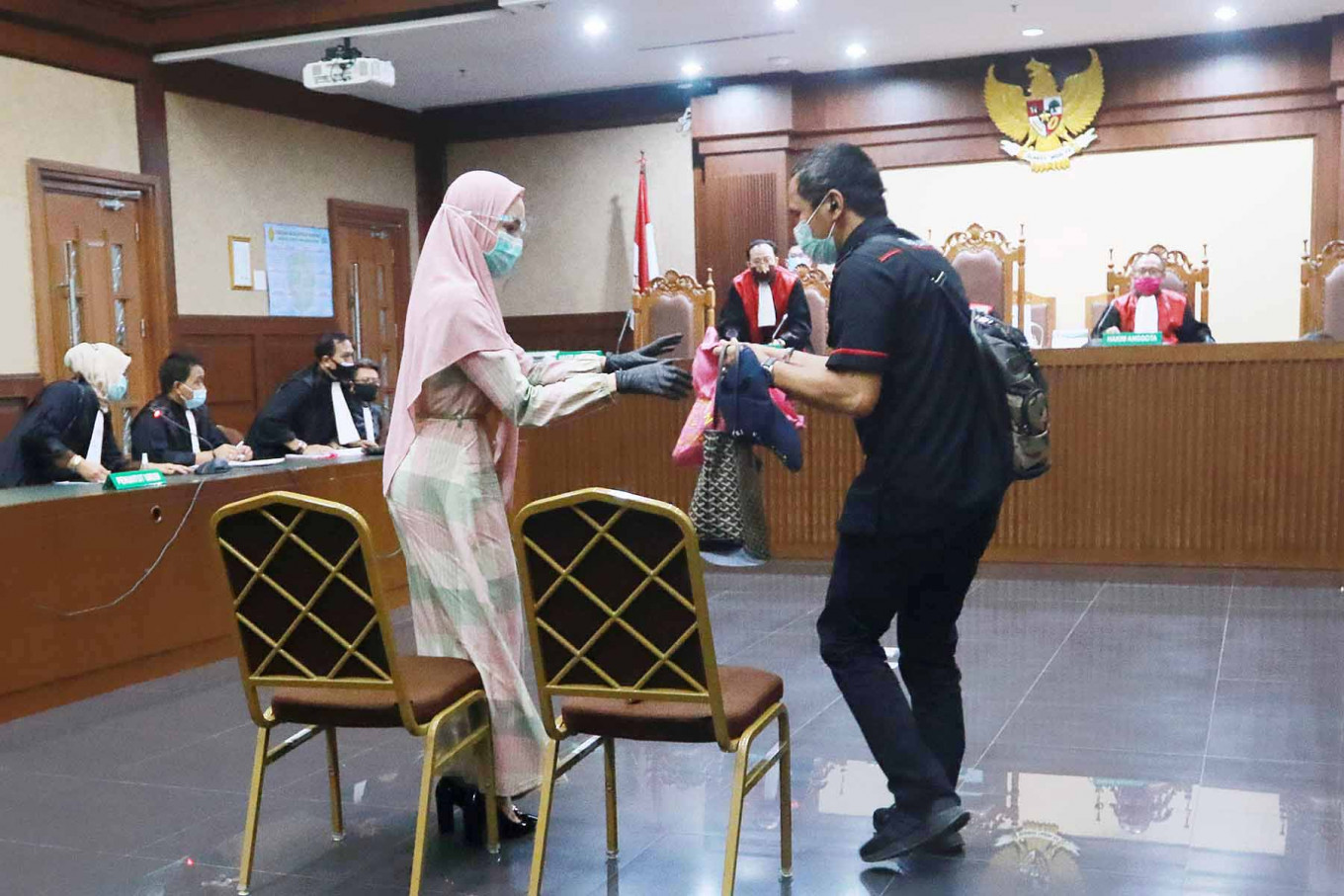Popular Reads
Top Results
Can't find what you're looking for?
View all search resultsPopular Reads
Top Results
Can't find what you're looking for?
View all search resultsMoney-laundering haven
Finance Minister Sri Mulyani Indrawati could have been misled by her subordinates regarding the analyzed reports on suspicious financial transactions filed by the PPATK to the Finance Ministry between 2009 and 2023.
Change text size
Gift Premium Articles
to Anyone
 Role change: Pinangki Sirna Malasari, a former prosecutor charged with accepting bribes and money laundering in relation to the case against graft convict and former fugitive Djoko Tjandra, attends the first hearing of her trial at the Central Jakarta District Court on Sept. 23, 2020. (JP/Dhoni Setiawan)
Role change: Pinangki Sirna Malasari, a former prosecutor charged with accepting bribes and money laundering in relation to the case against graft convict and former fugitive Djoko Tjandra, attends the first hearing of her trial at the Central Jakarta District Court on Sept. 23, 2020. (JP/Dhoni Setiawan)
P
ublic furor over the spat between the Financial Transaction Reports and Analysis Centre (PPATK), the Corruption Eradication Commission (KPK), and the Finance Ministry after the disclosure of 300 reports on suspicious financial transactions allegedly involving Rp 349 trillion (US$23 billion) should be a blessing in disguise to jolt the people on how Byzantine money laundering incidences have been in the country.
And judging from the explanations of Coordinating Political, Legal and Security Affairs Minister Mahfud MD in his capacity also as chief of the National Coordinating Committee for the Prevention and Eradication of Money Laundering, heads should soon start rolling within the Finance Ministry’s Inspectorate General, Directorate General of Taxation and Directorate General of Customs and Excise.
Mahfud, who disclosed the alleged financial scandals to the public early last month, told the House of Representatives on Wednesday that Finance Minister Sri Mulyani Indrawati could have been misled by her subordinates regarding the analyzed reports on suspicious financial transactions filed by the PPATK to the Finance Ministry between 2009 and 2023. Mahfud said Rp 35.5 trillion of the suspicious financial transactions involved 461 finance officials, mostly taxes, Rp 53.82 trillion implicating 30 financial officials and other parties, and Rp 260 trillion involving financial officials and other parties related to the investigations of predicate crimes.
We have indeed been baffled from the outset after Mahfud’s disclosure as to why not a single money-laundering case has been built out of so many analyzed reports from the PPATK whose staff consists mostly of professional financial experts and lawyers in monitoring financial transactions.
This is quite unfortunate because the 2010 Anti-Money Laundering law raises so many alarms about money laundering. The law imposes reporting and other obligations on a wide range of designated reporting parties, including banks, other financial services providers, card-payment providers, e-money providers, savings and loans cooperatives, commodities futures traders, property companies, car dealers, and traders of jewelry. All these designated reporting parties must comply with the Know-Your-Customer Code principles and report to the PPATK any unusual transactions with their customers.
The AML law stipulates much simpler procedures for building up cases because the onus of proof is shifted from the prosecutors to the defendants who must prove that the assets in question were acquired or owned through legitimate means. Money-laundering cases do not need to prove first the predicate crimes from which the money involved was derived.
Under the 2010 AML law, once defendants cannot prove that their assets were derived from legal means the state can confiscate those assets. The forfeiture is simply a penalty imposed on the perpetrator of a criminal act (money laundering).
But the blunt fact is there has never been adequate campaign and training to promote the AML program so that many law enforcers and even judges often do not fully understand the full process of clarifying suspicious financial transactions, investigating and prosecuting money laundering crimes, which is much simpler than the process of convicting conventional criminals. We should magnanimously admit that our country is still a haven for money laundering due to an acute lack of cooperation and coordination among the 15 law enforcement agencies.
Just several glaring examples of complete ignorance of suspicious financial transactions with strong indications of money laundering: We have often seen so much iron-clad legal evidence presented in the corruption court proceedings whereby the graft defendants asked their drivers, assistants, or personal aides to convert billions of rupiah into American or Singapore dollars. But none of the evidence had led to money laundering crimes because the money changers simply met the exchange request for fear of losing customers. There could be hundreds of thousands or even millions of such unusual transactions every year due to the lack of oversight of money changers.
Look at how the wife of former police general Ferdy Sambo, who was recently sentenced to death for the premeditated murder of his aide, admitted in court to having used the bank accounts of Sambo’s aides to keep hundreds of millions of rupiahs in deposits at state banks, way beyond their financial profiles and characteristics of a petty officer whose take-home pay is only about Rp 4 million. Sambo’s wife has not been investigated and charged with money laundering.










